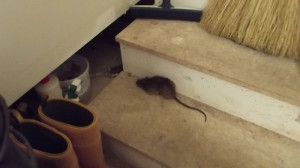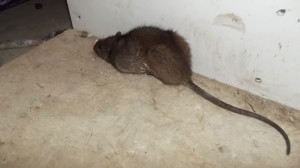Rat Removal In Massachusetts and New Hampshire Part Two
By Chris Williams on July 3, 2014.

Big rat in Portsmouth, NH.
Photo by Tim Chase

A really big rat!
Photo by Tim Chase
Dead Rat Removal
Katlyn Graham: Once you do get that rat, what is the process for dead rat removal in Massachusetts and New Hampshire?
Tim Chace: That’s a good question. The label specifies that they would like you to come back and remove any dead rodents if possible. There’s the rub. Oftentimes it’s not possible to remove a dead rodent. If you find one on the basement floor, we will be happy to come back and pick up and remove that thing in.
On most rat jobs, I like to do at least a two‑week follow‑up so that I can come out, examine the situation, see if the baits worked, re‑bait if necessary, realign the situation, see if our theory was correct, and assess it. Also, look for dead ones. If I’m in the basement, I’ll leave with a bag of them, hopefully.
Oftentimes, the rodent will die in an inopportune location such as a wall void, below a slab floor, or a crawlspace where there’s no access. That’s truly unfortunate. In most cases, we do not recommend digging for it because you can make an awful construction mess and not find the dead animal. Even though it smells bad right here, the odor could be coming out from someplace farther way and coming out that outlet.
In our experience, it’s not a good plan to dig them out unless you’re sure. Let’s say, a big stain on the Sheetrock? Go ahead, it’s probably that. Short of an obvious sign…maybe it’s scratched in the wall for two days and then stopped and smelled right there. That might be a good bet.
A rat’s generally less than 16 ounces. The amount of odor is usually involved with the amount of water that’s evaporating. A mouse weighs about an ounce. Three quarters of that is water. One dead mouse in the wall in the wintertime is going to give you about three weeks of low‑level “smells a little yucky.” If you’ve got a big dead rat in the wall, that might be three or four weeks.
In the summertime, as soon as an animal dies, the flies are on it. They’ve laid their eggs on it minutes after death. There’s something that the flies are able to do by locating dead animals very quickly. Once that happens, the little maggots and stuff come in. You get your carpet beetles, silverfish, and larder beetles. All the little things that take a corpse down will start working on that.
It doesn’t get bad until that membrane pops and the liquid starts to evaporate. That’s that yucky smell. Once that happens all that’s left is a little dry husk which has no odor at all. You’ve just got a little pile of bones and fur. That’s the end result. That will stay there in perpetuity.
Katlyn: I see. Those organisms break down the rat, you won’t have the smell forever.
Tim: No, it does go away. There are treatments like an ozone treatment, the same one that they do for a house that’s been burned. They get rid of that smoke smell. There are treatments that have been done for dead raccoons and things that have pervaded the crawlspace with six pounds of liquid and things. That’s a much different situation, a bigger body. The same processes take place, but it’s longer.
To get back to rat and mouse removal, the pest control company is slightly on the hook to remove obvious dead rats, but if we can’t get to it, there’s not much we can do. There may be companies that specialize in the removal of dead things in walls. I haven’t heard of them. “Dave’s Construction and Rat Wall Removal.”
In a lot of the cases, that’s not the biggest issue we have. The key thing to consider with rats and mice is that they’re chewing animals. They have to chew all the time. Not only are they damaging the structure by chewing, gnawing, pooping, and peeing on everything they can touch, they have the potential to cause a house fire at any moment.
They’d love to chew a wire, because it feels just like a vine or a piece of a tree that they’re evolutionary designed to hold and chew. Over 80 percent of unknown origin fires, they believe, are the result of some type of rodent activity, which is frightening.
Katlyn: That is frightening. You really want to make sure if you know where they are, you get them out. My goodness!
Tim: In pest control, we actually view the smell of a dead rat rodent as success, because we know that not only has our work been worthwhile, but we’ve probably got the culprit right there. It’s sad that the rat’s had a bad odor for a week, but it means that they can go back to sealing everything up and the problem’s solved.
Katlyn: In a restaurant, you definitely want to solve that problem.
Tim: It can get ugly with the feces and the poop. As we were discussing earlier, the rats are pretty smart. Once they realize nothing’s going to happen when they come out during dinnertime, there will be a big rat under the cook line. It’s just sitting there looking at the chef because he’s busy. That’s just not right.
Katlyn: No. Oh, my goodness! That is not right at all. Thank you for explaining that, Tim. Hopefully, some people have gotten some advice and will be able to remove their rats.
Tim: Give me a call if you see one.
Listen to The Bait Rats Find Irresistible: Part One!